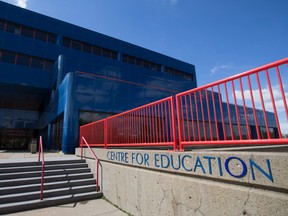How’s your province or territory serving to college students get better from pandemic education? Here is what they instructed us

Some younger learners are struggling to construct early studying expertise whereas others stumble over math ideas. Repeated pandemic pivots have left college students out of shape with classroom studying, impacted their psychological well being and distanced them from friends. The CBC Information collection Studying Curve explores the ramifications of COVID-19 for Canadian college students and what they’re going to have to get better from pandemic-disrupted education.
What college appears like below COVID-19 has differed relying on the place you’re in Canada, however all college students have skilled a minimum of some type of disruption to their studying since March 2020.
In simply the primary 14 months of the pandemic, for instance, province-wide closures of in-person education ranged from 9 weeks in British Columbia and Quebec to 19 weeks in Ontario — closures that later elevated in the course of the more moderen Delta and Omicron waves of COVID-19.
With college students from kindergarten to Grade 12 winding down a 3rd college 12 months impacted by COVID-19, CBC Information requested Canada’s provincial and territorial governments about their plans to assist college students get better from pandemic schooling.
We additionally requested a trio of specialists to evaluation the knowledge. They mentioned the main points shared do not go far sufficient and flagged key areas — from evaluation and curriculum reform to tutoring and different focused help — that want extra consideration to assist struggling learners catch up and likewise revitalize Canada’s schooling system.
A ‘sketch of a plan’
International schooling researcher Prachi Srivastava discovered a number of “distinctive and revolutionary” particulars inside the info submitted, corresponding to a dedication by the Northwest Territories to help college students as much as age 21 in its formal Okay-12 college system. Nonetheless, she remained typically unimpressed with the “sketch of a plan” most areas shared.
“These plans ought to have been made two years in the past,” mentioned Srivastava, a specialist in international emergency schooling and affiliate professor of schooling and international coverage at Western College in London, Ont.
“The literature on what to do in an emergency … that did not simply emerge yesterday. It has been round for 20-odd years.”
Prachi Srivastava, an affiliate professor of schooling and international coverage at Western College, explains the details that should be in any emergency schooling restoration plan.
Although community-level particulars would possibly differ attributable to completely different regional realities throughout Canada, she mentioned each restoration plan ought to cowl three core elements:
-
Reforming curriculum to handle studying that was affected throughout disruption intervals.
-
Boosting core expertise (literacy, numeracy and extra).
-
Concentrating on sources and investments to the communities most affected.
Srivastava was searching for extra element, together with from areas that touted high-dollar spending. Whether or not you are a member of the general public or an schooling skilled, she famous, it is troublesome to contextualize these quantities with out figuring out extra, corresponding to per-pupil expenditure or which communities particularly will profit.
For example, if a authorities pledges $50 million for a specific academic initiative, “Is that cash that is truly supplementing the price range or is it coming from some place else?” Srivastava requested. A giant sum additionally carries completely different weight if it is being divided between a province’s two million college students versus one other’s 100,000, she added.
- Do you will have a query about how children are recovering from pandemic-disrupted studying? Do you will have an expertise you need to share, or some concepts that would assist get children again on observe in school? Ship an e mail to ask@cbc.ca.
Quebec mentioned it is invested $82 million in a large-scale tutoring program, however Srivastava questions the effectiveness if it relies upon largely on on-line supply, “given what we all know in regards to the digital expertise.” In the meantime, Ontario in February pledged $175 million for varsity boards to implement tutoring applications, however mandated a really brief timeline for implementation — “that is one other drawback,” she mentioned.
College students share recollections, takeaways from pandemic education
But Srivastava underlined that investments in schooling aren’t a waste. She pointed to research that instructed that extended pandemic college closures would have a destructive impact on a rustic’s annual GDP, together with in G20 nations corresponding to Canada.
“This can be a actual funding. It is an financial funding. It is a social funding. It’s a human rights funding,” she mentioned.
“It’s each kid’s proper — globally and particularly in Canada — to have an excellent high quality schooling … and it has an enormous impact on our society long run.”
‘Studying loss is actual’
Paul Bennett, director of Halifax-based schooling analysis and consultancy agency the Schoolhouse Institute, additionally felt underwhelmed by the training restoration plan particulars the ministries and schooling departments supplied. He referred to as the approaches “scattered” and missing focus.
Provinces and territories appear “unclear about what the priorities are. [Is it] studying restoration? Focused enchancment in literacy and numeracy? Or is it a common strategy to supporting college students and their wellbeing via trauma-informed approaches?” mentioned Bennett, who can also be an adjunct professor of schooling at Saint Mary’s College.
“The place you scatter the spending round via these three areas, you find yourself having negligible impact as a result of there’s not sufficient focused on any one of many challenges to make a lot of a distinction.”
Although schooling is a provincial and territorial accountability, schooling guide Paul Bennett says recovering from education below COVID-19 ‘wants extra in the best way of concerted nationwide management.’
Bennett took subject with areas that seemingly aren’t “acknowledging that studying loss is actual and modifications need to be made,” together with what he feels is a rising pattern leaning away from standardized assessments.
“Suspending scholar evaluation has created an issue as a result of we do not have the baseline knowledge upon which to develop studying restoration plans,” he mentioned.
“We have been additional compromised by our incapability to see how a lot time [has] been misplaced and the implications for scholar studying. And so we have got a monumental problem forward of us.”
Bennett took British Columbia’s responses as a view “that as a result of college students had been solely out of faculty for eight to 10 weeks, relying on the varsity district, that they do not appear to have a studying restoration drawback.” He sees promise, nevertheless, within the data shared by Alberta.
The Prairie province is mandating assessments in Grades 1 via 3 beginning this fall, together with follow-up helps for college kids discovered to be struggling, and is increasing an e-tutoring hub for older elementary grades.
Bennett additionally praised Quebec’s sturdy investments in tutoring applications and Ontario extra just lately following go well with.
“Tutoring targeted on kindergarten to Grade 3, on studying and numeracy, and in preparation for college research within the senior highschool [years] would make sense,” he mentioned.
“Tutoring is the simplest type of studying help for pandemic college restoration and scholar restoration.”
Past ‘simply the fundamentals’
What Annie Kidder observed within the restoration plans was a repeated deal with studying loss, explicit in literacy and numeracy. Nonetheless, what the general public schooling advocate would favor to see extra is “an enormous image, visionary, complete plan” for addressing each the issues that arose throughout COVID-19 in addition to points that worsened up to now two years.
The normal 3Rs (studying, writing and arithmetic) stay vital, however so are the “new fundamentals,” mentioned Kidder, government director of Folks for Schooling, a nationwide public schooling, analysis and advocacy group primarily based in Toronto.
“It’s vital that children are the place they need to be when it comes to studying, writing and math — within the early grades, in highschool — nevertheless it’s additionally important that they are studying extra about the best way to talk, about relationships, about the best way to collaborate, about how they be taught and about what are referred to as variously transferable expertise or sturdy expertise,” she mentioned.
“We do need to be sure that all people is up-to-speed, however the definition of up-to-speed in 2022 is quite a bit completely different than it was, you realize, 10 years in the past.”
Relationships, college helps, transitions and in-person experiences that disappeared as a result of pandemic are ‘all important elements of youngsters’ schooling,’ says Folks for Schooling’s Annie Kidder.
Kidder praises areas being attentive to scholar psychological well being and wellbeing, together with these doing assessments in these areas as a part of broader approaches to measuring scholar outcomes past “doing standardized assessments in three topics.”
She additionally sees potential in schooling ministries and departments — corresponding to New Brunswick and Newfoundland and Labrador — pledging to satisfy and work along with stakeholders on schooling restoration versus creating coverage in isolation. She needs to see these consultations embody a number of on-the-ground views: from college students, dad and mom and educators to schooling researchers, well being care specialists and extra.
“There’s usually a spot between the concept you will have as a policymaker and the fact on the bottom,” Kidder mentioned. “It is one factor to jot down all of it down and develop [a] lovely coverage. It is one other factor to need to implement that.”
Although broad talks would possibly begin out “slightly bit messy” given a number of events collaborating, Kidder famous, she thinks this strategy will lead to stronger pandemic restoration plans that may additionally incorporate ongoing work, as an example, to handle fairness and systemic racism.
The street out of COVID-19 lecture rooms should incorporate shorter-term “catch-up” that is “built-in inside a longer-term plan,” she mentioned, calling it restoration plus renewal.
“There isn’t any going again to regular. There isn’t any getting issues again on observe. There may be transferring ahead and understanding… what sort of foundational position public schooling performs in all of our societal and financial success.”
COVID-19 has affected the previous three college years. How have your college students fared amid pandemic education? What are you most worried about? Share your experiences and considerations with us at ask@cbc.ca (Be sure you embody your identify and site. They could be featured on air on CBC Information Community.)

.jpg)
.jpg)





